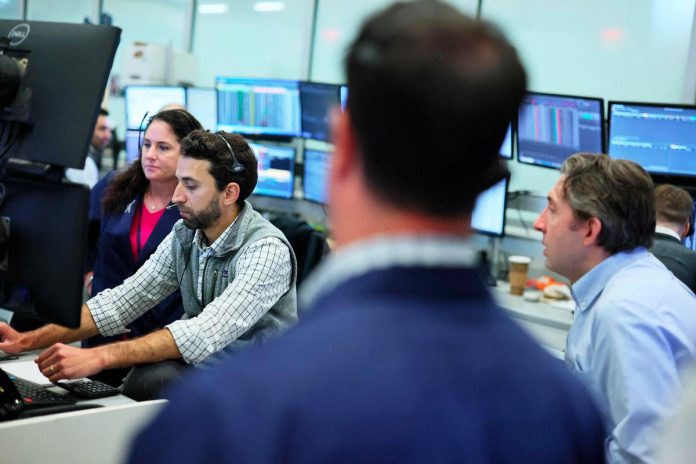NEW YORK: US stocks ended higher on Monday, recovering from Friday’s sharp losses as investors’ concerns over ongoing hostilities between Israel and Iran eased somehow, Xinhua reported.
Escalation of conflicts between Iran and Israel had briefly rattled markets — oil prices surged, the Cboe Volatility Index (VIX) spiked, and gold prices rose as investors sought safe havens. However, Monday’s action suggested confidence remained intact. High-yield credit spreads widened by just 2 basis points.
The Dow Jones Industrial Average rose 317.30 points, or 0.75 per cent, to 42,515.09. The S&P 500 added 56.14 points, or 0.94 per cent, to 6,033.11. The Nasdaq Composite Index increased by 294.39 points, or 1.52 per cent, to 19,701.21.
Seven of the 11 primary S&P 500 sectors ended in green, with communication services and technology leading the gainers by adding 1.53 per cent and 1.52 per cent, respectively. Meanwhile, utilities and health led the laggards by losing 0.50 per cent and 0.40 per cent, respectively.
Market history supports the idea that geopolitical shocks are often short-lived in their market impact.
According to Deutsche Bank analysts Parag Thatte and Binky Chadha, the S&P 500 typically drops around 6 per cent in the three weeks following a geopolitical event, but usually recovers those losses in the next three weeks.
Deutsche Bank’s Henry Allen added in a Monday note that geopolitical events tend to have lasting effects on equities only when they disrupt the real economy, either by slowing growth or driving inflation. So far, investors seem to be betting that neither scenario is likely in the near term.
Despite lingering geopolitical concerns, historically low equity positioning and resilient fundamentals may be keeping a broader sell-off at bay, allowing risk appetite to return for now. “Focus will remain on geopolitical headlines, but as long as the conflict stays limited between Israel and Iran, it’s unlikely to materially impact the markets,“ said Tom Essaye at the Sevens Report.
Tesla rose more than 1 per cent on Monday, while Meta Platforms climbed 2.9 per cent, helping power the broader market. Palantir, often seen as a beneficiary of rising geopolitical instability due to its defence and AI ties, rose nearly 3 per cent.
The rising move comes ahead of a key week for monetary policy. Investors digested a weaker-than-expected manufacturing survey released Monday morning by the New York Federal Reserves (Fed), adding to signs of slowing momentum in the industrial sector. Still, the data did little to shift expectations ahead of the Federal Reserve’s interest rate decision on Wednesday.
According to CME Group’s FedWatch Tool, futures markets are pricing in a 100 per cent chance that the Fed will hold rates steady, despite renewed pressure from US President Donald Trump, who has called on Fed Chair Jerome Powell to cut interest rates.
However, elevated oil prices stemming from the conflict in the Middle East are expected to keep inflation risks on the Fed’s radar and reduce the likelihood of rate cuts in the near term. “Markets got a reminder that tariffs aren’t the only potential source of market volatility,“ said Chris Larkin at E*Trade from Morgan Stanley. “Right now, markets are signalling they expect the situation in the Middle East to remain contained, but any surprises could have an oversized impact on sentiment.”








